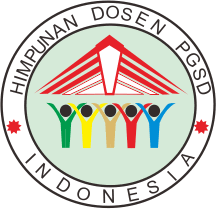Pengaruh model pembelajaran challenge based learning dan problem based learning terhadap literasi numerasi ditinjau dari self efficacy peserta didik kelas 5 sekolah dasar
Abstract
This research aims for analyze the Challenge Based Learning (CBL) and Problem Based Learning (PBL) learning models in numeracy abilities of grade 5 students at Sondakan State Elementary School, Surakarta, in terms of the level of self-ability. The subjects of this research were 49 grade 5 students consisting of 25 control class and 24 experimental class students. The research approach used was quasi-experimental with a non-equivalent control group design. The research sample consisted of two classes selected using purposive sampling, where one class applied the CBL model and the other class applied the PBL model. Research instruments include numeracy tests and self-efficacy questionnaires. Data analysis was carried out using the t-test to determine the average difference in numeracy ability between the two groups. The results of the study showed that there was a significant difference in increasing numeracy skills between the groups who studied with the CBL and PBL models. Apart from that, students' self-efficacy is also proven to have a significant influence on their numeracy abilities. Students with high levels of self-efficacy show better numeracy improvements compared to students with low levels of self-efficiency, both in CBL and PBL learning models.
Kata kunci: numeracy, learning models, self efficacyKeywords
Full Text:
PDFReferences
[1] D. I. Hidayatullah, Riyadi, and I. ragil W. Atmojo 2020 Implementasi model pembelajaran individualization ( TAI ) untuk meningkatkan keterampilan pemecahan masalah perkalian bilangan cacah peserta didik kelas V sekolah dasar Didakt. Dwija Indria 8(4), 8–13
[2] Z. Jihan Hanifa, R. Winarni, A. Surya 2021 Faktor yang Mempengaruhi Keterampilan Penalaran Matematis di Sekolah Dasar Didakt. Dwija Indria, 11(5), 30–34
[3] T. Maiza Dianti and R. Ahmad 2022 Optimizing the Role of Guidance and Counseling Teachers in the Transformation of 21st Century Education Literasi Nusant, 3(1), 11–12
[4] M. A. Ab Kadir 2017 What Teacher Knowledge Matters in Effectively Developing Critical Thinkers in the 21 st Century Curriculum? Think. Ski. Creat, 23(1), 79–90, doi: 10.1016/j.tsc.2016.10.011.
[5] OECD 2017 Mathematical Literacy (Framework: The PISA)
[6] Y. Rakhmawati and A. Mustadi 2022 The circumstances of literacy numeracy skill : Between notion and fact from elementary school students, 10(1) , 9–18
[7] Kemendikbud 2021 Asesmen Nasional: Lembar Tanya Jawab Kementeri. Pendidik. dan Kebud., 20(1), 1–32
[8] W. M. Lestari, J. Daryanto, and H. Hadiyah 2023 “Analisis kesulitan peserta didik dalam menyelesaikan soal numerasi pecahan pada Asesmen Kompetensi Minimum di sekolah dasar,” Didakt. Dwija Indria, 11( 1)
[9] Y. Fisabillillah and D. Rahmadanik 2022 Implementasi Penerapan Literasi Dan Numerasi Pada Pelaksanaan Kampus Mengajar Angkatan 3 Di Sdn 1 Kedungkumpul, Sukorame, Kabupaten Lamongan Community Dev. J. J. Pengabdi. Masy., 3(2), 876–883
[10] A. S. Khumaira, H. Nasbey, and D. Susanti 2024 LKPD Berbasis Model Pembelajaran Challenge-Based Learning Terintegrasi Stem Pada Materi Pemanasan Global, 12(1), 33–40
[11] T. Yulianto, I. Pramudya, and I. Slamet 2020 How the Effects of the 21st-Century Learning Model on Higher Level Thinking Ability and Mathematical Learning Creativity Viewed from Student Mathematical Disposition, 2(7) 1066–1076
[12] E. Lutters, J. Massa, R. Damgrave, S. Thiede, and L. Gommer 2022 Integration of Learning and Research in a Multi-Perspective Learning Factory.
[13] W. Yang, H. Li, A. Su, and L. Ding 2023 Application of problem based learning ( PBL ) and case based learning ( CBL ) in the teaching of international classification of diseases encoding Sci. Rep, 13(1), 1–9
[14] M. Leijon, P. Gudmundsson, P. Staaf, and C. Christersson 2022 Challenge based learning in higher education– A systematic literature review Innov. Educ. Teach. Int., 59(5), 609–618
[15] V. Rahayu, N. Rachmani, and S. Budi 2024 Implementasi Model Challenge Based Learning Terintegrasi STEAM Terhadap Kemampuan Representasi Matematis Siswa, 7(2), 559–569
[16] D. P. Susanne Garvis 2016 Asia-Pacific Perspectives on Teacher Self-Efficacy. sensespublisher
Refbacks
- There are currently no refbacks.



